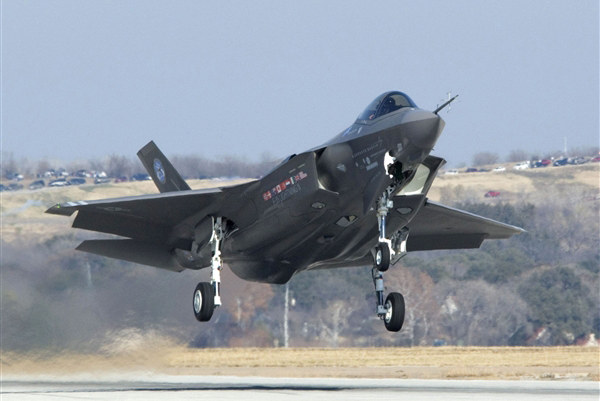Air Force F-35 Base Decision Threatens 1,300 Vermont Homes

If the Pentagon bases its new F-35 nuclear-capable attack fighter at Burlington International Airport, it is expected to put 1,366 nearby houses into a noise zone that the federal government defines as “incompatible with residential use” This from the Air Force’s own draft Environmental Impact Statement (EIS) which was released in April. Grassroots organizing and opposition has been growing steadily at the local level against the F-35 plan, and cuts across party lines. The real battle is against an entrenched political system which too often ignores the needs of their supposed constituency. This is where independents can play a major role, as they often understand the nature of our political system better than those beholden to the two parties.
The F-35 stealth fighter is ten years behind schedule, about 100 per cent over budget, and won’t be deployed before 2019, but the prospect of having it in Vermont has sparked growing public and local government resistance to the plan. Among the most serious concerns are noise, safety, lost housing, degraded air quality, limited job creation, depressed property values, and negative economic impact. Already the South Burlington City Council has voted 4-1 to reject the expansion of the military base and other towns in the area have indicated doubts, without yet taking a formal position.
Support for the Pentagon plan comes from establishment politicians in monolithic, bi-partisan form from Vermont’s highest public officials. These include both U.S. Senators, Democrat Patrick Leahy and even independent Sen. Bernie Sanders; Vermont’s lone Congressman, Democrat Peter Welch; Vermont Governor Peter Shumlin (Democrat) and Lt. Gov. Phil Scott (Republican); Burlington Mayor Miro Weinberger, Democrat, as well as Republican gubernatorial candidate Randy Brock. There is no prominent Vermont office holder standing in opposition. Perhaps this type of support will lessen should independents start being elected at all levels.
that: “If you read the various categories in the Environmental Impact Statement that the Air Force produced you will see that in just about every category that there were significant negative effects on South Burlington…. There are far better basing for the F-35 that in a small state in a small community in a small town. We are sacrificing our town, we are sacrificing our community. In my mind, the F-35s do not belong in this area.”Retired U.S. Air Force Colonel Rose Greco is a not-so-prominent office holder who opposes the Pentagon plan in her role as chair of the South Burlington City Council. On May 14, she voted with the 4-1 majority of her council to reject basing F-35s in their town. Col. Greco explained
Another town close to the airport, Winooski, has already seen one public demonstration of about 100 people against the F-35, but the city council has yet to take a position for or against the basing. The city council’s unofficial position is that it has a number of questions to which it needs answers before deciding. The Air Force has apologized for failing to provide the city with its impact statement before the public hearing. The Winooski school board, however, has voted against the warplanes.
The South Burlington school district, while stopping short of taking a position on F-35 basing, issued a detailed critique of the plan as it affects the districts 5 schools, 500 teachers, and 2400 students. The district letter discusses omissions in the Air Force environmental statement relating to noise impact on the schools, cumulative impacts on the district, and how the Air Force might mitigate the tax base losses caused by eliminated housing.
The city of Burlington is far enough away from the airport that it is unaffected by the jet noise that renders areas “incompatible with residential use.” Mayor Weinberger, a former airport commissioner, skipped the public hearing on environmental impact and came out in favor of the F-35 basing without offering any detailed analysis while calling jet noise “a limited impact.”
“Not a single person will lose housing because of this,” Weinberger said, without explaining the environmental reports conclusion that more than 1300 houses would end up in a zone “incompatible with residential use.”
The Burlington City Council met on Monday to take up the F-35 issue and opponents organized in large numbers to make their views known.
Local opposition to having 18 or more F-35s here has been building for more than two years, inspired in part by a similar resistance movement in Tucson, Arizona, another example of grassroots organizing that cuts across traditional party lines and includes independents.




